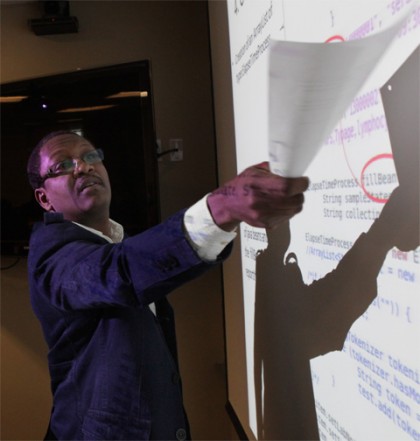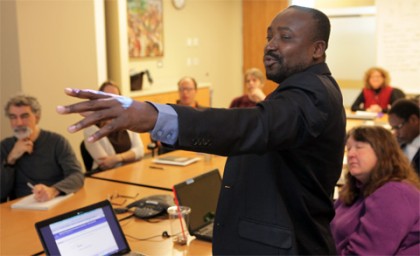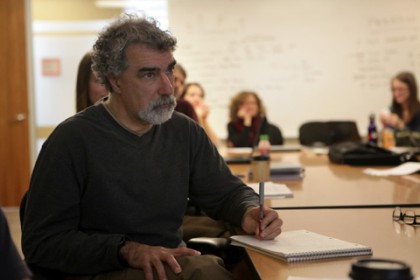Report by Yonathan Alemu, I-TECH Ethiopia
A new regional referral health and research laboratory in Afar regional state, in Semera was inaugurated on February 9, 2013. The regional laboratory was renovated and established by I-TECH through partnership with the Ethiopian Health and Nutrition Research Institute (EHNRI) and collaboration with the Afar Regional Health Bureau and funded by the U.S. President’s Emergency Plan for AIDS Relief (PEPFAR) through the United States Centers for Disease Control and Prevention (CDC).
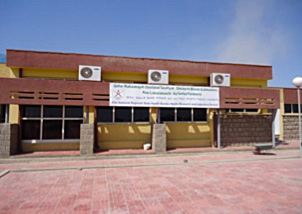
The new regional health facility, which is well equipped with advanced laboratory diagnostic technologies, was handed over to the Regional State with eventful program that brought together high level officials from the Federal Ministry of Health, the Afar regional state, the EHNRI, Afar regional health bureau and I-TECH Ethiopia leadership team.
The Afar regional Health Bureau Head, and the EHNRI regional laboratory capacity building directorate, Director addressed the impacts of partnership/collaboration to the improvement of the health system in the country in general and in the Afar region in particular and also applauded the I-TECH-Ethiopia’s significant contribution in strengthening the laboratory system in the Afar region.
The health facilities in the Afar region were small in number and were not well developed to provide standard and quality laboratory diagnosis services for the highly prevalent and deadliest diseases, but this is now changing following the intensified national health system strengthening programs in the country.
Dr. Nega G/yesus, the acting country Director of I-TECH Ethiopia acknowledged the long years of collaboration and partnership efforts put up by partners and the regional health bureau for all the successes achieved and appreciated the unwavering support of the United States Government in the health sector development in Ethiopia.
This new regional referral health laboratory will be a center to systematically build capacities of laboratories in the region to improve, assure and maintain quality laboratory diagnostic services. Moreover, it strengthens the regional referral system that would significantly improve the diagnostic capacities of laboratories for such as, HIV/AIDS, Malaria, TB, STIs and other opportunistic and tropical diseases, playing an integral role in Ethiopia’s public health emergency response system.
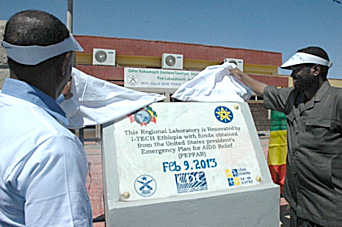 Dr. Wubshet Mamo, I-TECH Ethiopia’s Laboratory Program Director said, “The goal of the PEPFAR laboratory program is to support countries implement laboratory services in a sustainable manner to provide quality diagnostic tests, strengthen integrated laboratory systems and support and/or establish country or regional laboratory institutions. Establishing this modern laboratory, which is the 1st in the Afar regional state and the 9th regional referral health laboratory in the country will play a substantial role in changing the region’s laboratory diagnostic service quality, ensuring accurate and reliable laboratory test results that every patient deserves to get.”
Dr. Wubshet Mamo, I-TECH Ethiopia’s Laboratory Program Director said, “The goal of the PEPFAR laboratory program is to support countries implement laboratory services in a sustainable manner to provide quality diagnostic tests, strengthen integrated laboratory systems and support and/or establish country or regional laboratory institutions. Establishing this modern laboratory, which is the 1st in the Afar regional state and the 9th regional referral health laboratory in the country will play a substantial role in changing the region’s laboratory diagnostic service quality, ensuring accurate and reliable laboratory test results that every patient deserves to get.”
He further explained that the role of this regional laboratory primarily will be assuring the quality of laboratory services through conducting external quality assessment, providing referral testing services and strengthening the referral system, supporting in skill building of laboratory professionals, conducting disease surveillance and taking appropriate measures in case of emerging infections in the region. This laboratory will also be a hub for evidence-based interventions (operational health research). More importantly, supporting laboratories in the region to improve their laboratory quality system towards the WHO-AFRO step-wise laboratory accreditation will be another key role of this regional laboratory facility, said Dr Mamo.
The establishment of this Regional Referral Health Laboratory will have significant impact in building the capacities of the hospitals and health centers in the Afar region to provide standardized and quality laboratory services to the people in the region.
If there is one reason that shines the glowing happiness of the local leaders over the scorching sun during the event; it is the anticipated reduction in referrals to distant cities for a better laboratory diagnosis.
